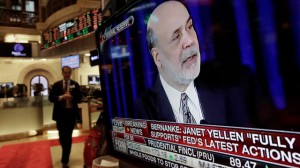
The news conference of Federal Reserve Chairman Ben Bernanke appears on a television screen at a trading post on the floor of the New York Stock Exchange, Wednesday, Dec. 18, 2013. (AP Photo/Richard Drew)
For the past 40 years, corporate America has spent untold millions convincing lawmakers and the wider public that government intervention in the private sector results in painful unintended consequences that harm us all. At the same time, corporate-backed think tanks and media outlets have advanced the narrative that public benefits create a culture of dependency, and by doing so ultimately do their recipients more harm than good.
The hypocrisy of these claims is becoming increasingly evident as low-wage employers — notably retailers and the fast-food industry — enjoy profits subsidized by their workers’ reliance on public benefits. These firms are the real “welfare queens” in today’s economy.
And that also appears to be the case higher up on the economic ladder — much higher up. This week, Alexis Goldstein noticed a similarity between two headline-grabbing numbers. She writes:
Earlier this year, Bloomberg calculated that the top 10 US banks receive $83 billion a year in subsidies from the government, due to their cheap cost of funding and the preferential treatment creditors give them because they assume the government sees them as TBTF.
In November, a NYT analysis of a Johnson Associates survey found that the top eight US banks set aside $91.44 billion for bonuses in 2013.
You can read more of her research at the Because Finance is Boring Tumbler.

